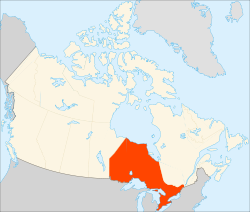The Ontario Portal


Ontario (/ɒnˈtɛərioʊ/ on-TAIR-ee-oh; French: [ɔ̃taʁjo]) is the southernmost province of Canada. Located in Central Canada, Ontario is the country's most populous province. As of the 2021 Canadian census, it is home to 38.5 percent of the country's population, and is the second-largest province by total area (after Quebec). Ontario is Canada's fourth-largest jurisdiction in total area of all the Canadian provinces and territories. It is home to the nation's capital, Ottawa, and its most populous city, Toronto, which is Ontario's provincial capital.
Ontario is bordered by the province of Manitoba to the west, Hudson Bay and James Bay to the north, and Quebec to the east and northeast. To the south, it is bordered by the U.S. states of (from west to east) Minnesota, Michigan, Ohio, Pennsylvania, and New York. Almost all of Ontario's 2,700 km (1,700 mi) border with the United States follows rivers and lakes: from the westerly Lake of the Woods, eastward along the major rivers and lakes of the Great Lakes/Saint Lawrence River drainage system. There is only about 1 km (5⁄8 mi) of actual land border, made up of portages including Height of Land Portage on the Minnesota border.
The great majority of Ontario's population and arable land is in Southern Ontario, and while agriculture remains a significant industry, the region's economy depends highly on manufacturing. In contrast, Northern Ontario is sparsely populated with cold winters and heavy forestation, with mining and forestry making up the region's major industries. (Full article...)
Selected article -

Mississauga (/ˌmɪsɪˈsɔːɡə/ MISS-iss-AW-gə) is a Canadian city in the province of Ontario. Situated on the western shore of Lake Ontario in the Regional Municipality of Peel, it borders Toronto (Etobicoke) to the east, Brampton to the north, Milton to the northwest, and Oakville to the southwest. Although Mississauga was initially a car-centric city, significant strides have been made to improve walkability and add cycling lanes, with most major arteries having bi-directional bike lanes. The city's downtown is home to several transit hubs, such as Square One Bus Terminal, and the City Centre Transit Terminal. With a population of 717,961 as of 2021, Mississauga is the seventh-most populous municipality in Canada, third-most in Ontario, and second-most in the Greater Toronto Area (GTA) after Toronto itself. However, for the first time in its history, the city's population declined according to the 2021 census, from a 2016 population of 721,599 to 717,961, a 0.5 per cent decrease.
The growth of Mississauga was initially attributed to its proximity to Toronto. However, during the latter half of the 20th century, the city attracted a diverse and multicultural population. Over time, it built up a thriving, transit-oriented central business district of its own, which is now known as Mississauga City Centre. Malton, a neighbourhood of the city located in its northeast end, is home to Toronto Pearson International Airport, Canada's busiest airport, as well as the headquarters of many Canadian and multinational corporations. Mississauga is not a traditional city, but is instead an amalgamation of three former villages, two townships, and a number of rural hamlets (a general pattern common to several suburban GTA cities) that were significant population centres, with none being clearly dominant, prior to the city's incorporation that later coalesced into a single urban area.
Indigenous people have lived in the area for thousands of years and Mississauga is situated on the traditional territory of the Huron-Wendat, Haudenosaunee and Anishinaabeg people, including the namesake Mississaugas. Most of present-day Mississauga was founded in 1805 as Toronto Township within York County, and became part of Peel County when new counties were formed by splitting off parts of the original county in 1851. Mississauga itself was established in 1968 as a town, and was reincorporated as a city in 1974, when Peel was restructured into a regional municipality. (Full article...)General images
Surrounding areas
Selected biography -

Arthur Albert Irwin (February 14, 1858 – July 16, 1921), nicknamed "Doc", "Sandy", "Cutrate" or "Foxy", was a Canadian-American shortstop and manager in Major League Baseball (MLB) during the late nineteenth century. He played regularly in the major leagues for eleven years, spending two of those seasons as a player-manager. He played on the 1884 Providence Grays team which won the first interleague series to decide the world champions of baseball. Irwin then served as a major league manager for several years.
Irwin occupied numerous baseball roles in the latter years of his career, having spent time as a college baseball coach, a major league scout and business manager, a minor league owner and manager, and a National League umpire. For most of Irwin's career, the collegiate and professional baseball schedules allowed him to hold positions at both levels in the same year. (Full article...)Selected image
Did you know? -
- ... that nearly every person in Val Gagné, Ontario, died in the 1916 Matheson Fire, and the settlement was renamed to honour the heroic efforts of the parish priest?
Related projects and portals
Topics
Categories
Things you can do
- Help expand stub articles: There are numerous stub articles relating to Ontario. You can help by expanding them. See Ontario stubs for a list. Also, for geographical (places) stubs, refer to:
- Eastern Ontario: Eastern Ontario geography stubs
- Toronto: Toronto geography stubs
- Ottawa: Ottawa stubs - All stubs relating to Ottawa in general
- Northern Ontario: Northern Ontario geography stubs
- Western Ontario: Western Ontario geography stubs
- Golden Horseshoe: Golden Horseshoe geography stubs
Associated Wikimedia -
The following Wikimedia Foundation sister projects provide more on this subject:
-
Commons
Free media repository -
Wikibooks
Free textbooks and manuals -
Wikidata
Free knowledge base -
Wikinews
Free-content news -
Wikiquote
Collection of quotations -
Wikisource
Free-content library -
Wikiversity
Free learning tools -
Wikivoyage
Free travel guide -
Wiktionary
Dictionary and thesaurus
© MMXXIII Rich X Search. We shall prevail. All rights reserved. Rich X Search







































